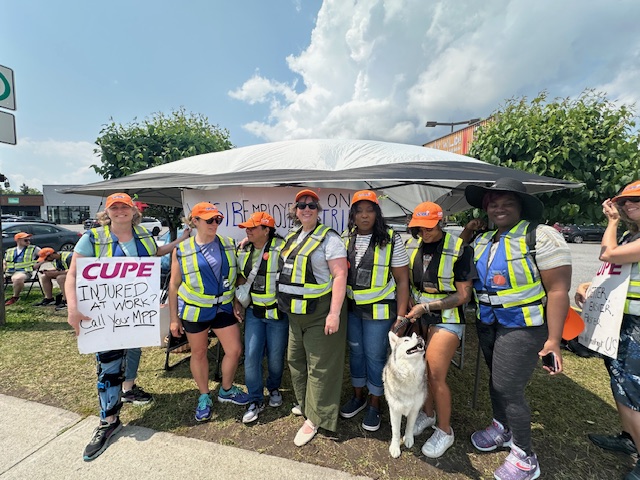From pandemic preparedness and emergency management to terrorism and cyber attacks, the organizers of the upcoming 19th World Conference on Disaster Management has lined up a number of high-profile experts to speak on a variety of topics of great interest to the health and safety community.
Held on June 21 to 24 at the Metro Toronto Convention Centre, the conference offers some valuable insight into the current risks facing the world and how to improve preparedness, response and recovery when emergency strikes.
Organized by Diversified Business Communications – Canada in association with the Canadian Centre for Emergency Preparedness, the World Conference on Disaster Management draws in international experts from 40 countries to and showcases a wide range of exhibits on the latest innovations in disaster management products and services.
 The opening ceremony will be held on Monday, June 22, with a keynote from John Merkovsky, global leader of March Inc.’s risk consulting practice. Merkovsky will provide an overview of emerging trends in the global risk landscape, his perspective on corporate pandemic preparedness and lessons learned from the recent H1N1 outbreak, among other things.
The opening ceremony will be held on Monday, June 22, with a keynote from John Merkovsky, global leader of March Inc.’s risk consulting practice. Merkovsky will provide an overview of emerging trends in the global risk landscape, his perspective on corporate pandemic preparedness and lessons learned from the recent H1N1 outbreak, among other things.
Allison McGeer, a microbiologist and infectious disease consultant at Mount Sinai Hospital in Toronto, will provide an update on the H1N1 pandemic, including a clear understanding of the virus and its impact. Last week the World Health Organization elevated the H1N1 pandemic from a level five to a level six pandemic, prompting the Canadian Centre for Emergency Preparedness to issue caution to communities and companies to prepare for a full-scale pandemic.
As of June 15, 2009 the number of confirmed cases of H1N1 flu in Canada has reached 4,049. To date, 212 hospitalizations and seven deaths have been reported among laboratory-confirmed cases.
Here’s a look at some of the sessions at the 19th World Conference on Disaster Management.
Monday, June 22
· 8:30 a.m. – Opening plenary by John Merkovsky, Global Leader of Marsh Inc.’s Risk Consulting Practice, who will provide an overview of emerging trends in the global risk landscape, his perspective on how well prepared organizations are to respond using lessons learned from the recent H1N1 pandemic, and advice regarding how to create a “threat neutral” environment that is conducive to immediate action no matter what the next event may be.
· 9:45 a.m. – A presentation called Lead, Follow or Get Out of the Way? by Jim Stanton, a former CTV broadcaster and President of Jim Stanton & Associates, who will discuss the importance of being aware of what is being said on-line during a crisis in this new age of “i-witnesses,” people who use the World Wide Web, satellite technology and personal digital assistants (PDAs) to communicate.
· 9:45 a.m. – Could the damages of Tropical Storm Fay have been lessened or prevented by effective planning? R. Samuel Winningham, Senior Emergency Management Specialist for the U.S. Federal Emergency Management Agency (FEMA), will discuss the lessons learned from Florida’s mitigation plans and explore the emerging trend of increased mitigation planning in the U.S.
· 9:45 a.m. – A look at a unique social experiment in New Zealand that is attempting to develop resilient communities by applying common sense, instead of relying on help or funding from external agencies. Jarrod Coburn, CEO of New Zealand Resilience Trust, will provide a list of tools that can be used to motivate communities, and to make them more self-aware and responsible for their own emergency preparedness.
· 11:00 a.m. – Kevin Coleman, Strategic Consultant at the Technolytics Institute (a U.S.-based privately held think-tank) will outline the six types of terrorism – chemical, biological, radiation, nuclear, explosive and cyber, and how to prepare for each. He will also unveil research findings from a recent study indicating that only five per cent of organizations consider all six types when forming a disaster plan.
· 11:00 a.m. – A session called What Hackers Don’t Want You to Know About Identity Management by IBM executive Jeff Crume who will update some of the more recent myths and misconceptions in the IT industry, and provide advice on how to avoid the common pitfalls associated with biometric and RFID technology, as well as other forms of identity management technology.
· 1:30 p.m. – An update on the H1N1 pandemic, including a clear understanding of the virus and its impact, by Allison McGeer, Microbiologist and Infectious Disease Consultant at Toronto-based Mount Sinai Hospital.
· 4:00 p.m. – Just as companies conduct regular audits of financial controls, they should also be examining their business continuity plans. Presenter Ted Brown, President and CEO of KETCHConsulting, will provide a 20-question self evaluation list that can be used as a starting point for auditing any corporate business continuity plan.
Tuesday, June 23
· 8:00 a.m. – Opening remarks by Jim Hall, Vice-President, Sales and Marketing, Roche Canada.
· 9:45 a.m. – When disaster strikes, can on-line information sharing networks be trusted to help spread the word? Jeanette Sutton, a Research Associate at the University of Colorado Natural Hazards Center, will show how on-line information sharing networks like Facebook, Twitter and MySpace are revolutionizing the way emergency professionals communicate during a crisis.
· 9:45 a.m. – A look at how countries are working together to prepare for the next pandemic, by Suzanne Bernier, Emergency Management Program Co-ordinator, Canadian Workplace Safety and Insurance Board.
· 11:00 a.m. – Dana Libby, a Captain in the U.S. Salvation Army, will share his firsthand experience in helping to co-ordinate the response to Hurricane Ike using newly-developed “what-if” mapping software to co-ordinate the efforts of a mass care program.
· 11:00 a.m. – Due to current greenhouse gas concentrations, historic extreme weather events are no longer useful in predicting future climate scenarios. This means emergency mangers need to develop new strategies to safeguard the public against new climatic threats. Allan Douglas, Co-ordinator for the Ontario Centre for Climate Impacts and Adaptation Resources, will introduce a new tool for identifying climate change risks so they can be effectively integrated into an existing emergency planning framework.
· 1:30 p.m. – Advice on how to recognize and plan for “pandemic tipping points,” the resulting loss of personnel, critical infrastructure and supply chain that can severely challenge operational continuity during a pandemic. David Tickner, a Consulting Principal with Computrix Services Pty. Ltd., will share his experiences as part of the Australian government’s critical infrastructure protection program.
· 2:45 p.m. – An examination of the lessons learned during the H1N1 pandemic and the steps that should be taken now to prepare for another potentially deadly flu season this winter, by Regina Phelps, President EMS Solutions Inc.
· 4:00 p.m. – Peter Anderson, Director of the Telematics Research Lab at Simon Fraser University, will present the findings from a recent pilot project in Sri Lanka intended to help design a last-mile hazard information dissemination system that can be used as an effective warning response. The study involved 32 of the villages impacted by the 2004 tsunami.
Wednesday, June 24
· 8:15 a.m. – A first-ever panel discussion moderated by Peter Power, Managing Director, Visor Consultants (UK) Ltd., that brings together an international panel to discuss the trend towards organizational resilience in both the public and private sectors.
· 11:00 a.m. – As the use of cyberspace for conducting malicious intent continues to grow at an alarming rate, former Director of the U.S. Department of Homeland Security’s National Cyber Security Division, and current Chairman and CEO of U.S.-based NetWitness Corp, Amit Yoran will remind attendees no one is protected in this new, heavily-interconnected world, and that the best defense to the ever-increasing threat of cyber attack is a comprehensive response plan. Building on the premise that “you don’t know what you don’t know,” Yoran urges risk management decision makers to gain a better technical understanding of their computer environments as a starting point for preparedness.
· 12:15 p.m. – Closing luncheon and address by Warren Faidley, CEO of Storm Risk Consulting Services and Weatherstock Inc., a full-time professional storm chaser whose hands-on experience with hazardous weather and natural disasters has made him one of the world’s most respected experts on severe weather interception, safety and survival.
Held on June 21 to 24 at the Metro Toronto Convention Centre, the conference offers some valuable insight into the current risks facing the world and how to improve preparedness, response and recovery when emergency strikes.
Organized by Diversified Business Communications – Canada in association with the Canadian Centre for Emergency Preparedness, the World Conference on Disaster Management draws in international experts from 40 countries to and showcases a wide range of exhibits on the latest innovations in disaster management products and services.
 The opening ceremony will be held on Monday, June 22, with a keynote from John Merkovsky, global leader of March Inc.’s risk consulting practice. Merkovsky will provide an overview of emerging trends in the global risk landscape, his perspective on corporate pandemic preparedness and lessons learned from the recent H1N1 outbreak, among other things.
The opening ceremony will be held on Monday, June 22, with a keynote from John Merkovsky, global leader of March Inc.’s risk consulting practice. Merkovsky will provide an overview of emerging trends in the global risk landscape, his perspective on corporate pandemic preparedness and lessons learned from the recent H1N1 outbreak, among other things.Allison McGeer, a microbiologist and infectious disease consultant at Mount Sinai Hospital in Toronto, will provide an update on the H1N1 pandemic, including a clear understanding of the virus and its impact. Last week the World Health Organization elevated the H1N1 pandemic from a level five to a level six pandemic, prompting the Canadian Centre for Emergency Preparedness to issue caution to communities and companies to prepare for a full-scale pandemic.
As of June 15, 2009 the number of confirmed cases of H1N1 flu in Canada has reached 4,049. To date, 212 hospitalizations and seven deaths have been reported among laboratory-confirmed cases.
Here’s a look at some of the sessions at the 19th World Conference on Disaster Management.
Monday, June 22
· 8:30 a.m. – Opening plenary by John Merkovsky, Global Leader of Marsh Inc.’s Risk Consulting Practice, who will provide an overview of emerging trends in the global risk landscape, his perspective on how well prepared organizations are to respond using lessons learned from the recent H1N1 pandemic, and advice regarding how to create a “threat neutral” environment that is conducive to immediate action no matter what the next event may be.
· 9:45 a.m. – A presentation called Lead, Follow or Get Out of the Way? by Jim Stanton, a former CTV broadcaster and President of Jim Stanton & Associates, who will discuss the importance of being aware of what is being said on-line during a crisis in this new age of “i-witnesses,” people who use the World Wide Web, satellite technology and personal digital assistants (PDAs) to communicate.
· 9:45 a.m. – Could the damages of Tropical Storm Fay have been lessened or prevented by effective planning? R. Samuel Winningham, Senior Emergency Management Specialist for the U.S. Federal Emergency Management Agency (FEMA), will discuss the lessons learned from Florida’s mitigation plans and explore the emerging trend of increased mitigation planning in the U.S.
· 9:45 a.m. – A look at a unique social experiment in New Zealand that is attempting to develop resilient communities by applying common sense, instead of relying on help or funding from external agencies. Jarrod Coburn, CEO of New Zealand Resilience Trust, will provide a list of tools that can be used to motivate communities, and to make them more self-aware and responsible for their own emergency preparedness.
· 11:00 a.m. – Kevin Coleman, Strategic Consultant at the Technolytics Institute (a U.S.-based privately held think-tank) will outline the six types of terrorism – chemical, biological, radiation, nuclear, explosive and cyber, and how to prepare for each. He will also unveil research findings from a recent study indicating that only five per cent of organizations consider all six types when forming a disaster plan.
· 11:00 a.m. – A session called What Hackers Don’t Want You to Know About Identity Management by IBM executive Jeff Crume who will update some of the more recent myths and misconceptions in the IT industry, and provide advice on how to avoid the common pitfalls associated with biometric and RFID technology, as well as other forms of identity management technology.
· 1:30 p.m. – An update on the H1N1 pandemic, including a clear understanding of the virus and its impact, by Allison McGeer, Microbiologist and Infectious Disease Consultant at Toronto-based Mount Sinai Hospital.
· 4:00 p.m. – Just as companies conduct regular audits of financial controls, they should also be examining their business continuity plans. Presenter Ted Brown, President and CEO of KETCHConsulting, will provide a 20-question self evaluation list that can be used as a starting point for auditing any corporate business continuity plan.
Tuesday, June 23
· 8:00 a.m. – Opening remarks by Jim Hall, Vice-President, Sales and Marketing, Roche Canada.
· 9:45 a.m. – When disaster strikes, can on-line information sharing networks be trusted to help spread the word? Jeanette Sutton, a Research Associate at the University of Colorado Natural Hazards Center, will show how on-line information sharing networks like Facebook, Twitter and MySpace are revolutionizing the way emergency professionals communicate during a crisis.
· 9:45 a.m. – A look at how countries are working together to prepare for the next pandemic, by Suzanne Bernier, Emergency Management Program Co-ordinator, Canadian Workplace Safety and Insurance Board.
· 11:00 a.m. – Dana Libby, a Captain in the U.S. Salvation Army, will share his firsthand experience in helping to co-ordinate the response to Hurricane Ike using newly-developed “what-if” mapping software to co-ordinate the efforts of a mass care program.
· 11:00 a.m. – Due to current greenhouse gas concentrations, historic extreme weather events are no longer useful in predicting future climate scenarios. This means emergency mangers need to develop new strategies to safeguard the public against new climatic threats. Allan Douglas, Co-ordinator for the Ontario Centre for Climate Impacts and Adaptation Resources, will introduce a new tool for identifying climate change risks so they can be effectively integrated into an existing emergency planning framework.
· 1:30 p.m. – Advice on how to recognize and plan for “pandemic tipping points,” the resulting loss of personnel, critical infrastructure and supply chain that can severely challenge operational continuity during a pandemic. David Tickner, a Consulting Principal with Computrix Services Pty. Ltd., will share his experiences as part of the Australian government’s critical infrastructure protection program.
· 2:45 p.m. – An examination of the lessons learned during the H1N1 pandemic and the steps that should be taken now to prepare for another potentially deadly flu season this winter, by Regina Phelps, President EMS Solutions Inc.
· 4:00 p.m. – Peter Anderson, Director of the Telematics Research Lab at Simon Fraser University, will present the findings from a recent pilot project in Sri Lanka intended to help design a last-mile hazard information dissemination system that can be used as an effective warning response. The study involved 32 of the villages impacted by the 2004 tsunami.
Wednesday, June 24
· 8:15 a.m. – A first-ever panel discussion moderated by Peter Power, Managing Director, Visor Consultants (UK) Ltd., that brings together an international panel to discuss the trend towards organizational resilience in both the public and private sectors.
· 11:00 a.m. – As the use of cyberspace for conducting malicious intent continues to grow at an alarming rate, former Director of the U.S. Department of Homeland Security’s National Cyber Security Division, and current Chairman and CEO of U.S.-based NetWitness Corp, Amit Yoran will remind attendees no one is protected in this new, heavily-interconnected world, and that the best defense to the ever-increasing threat of cyber attack is a comprehensive response plan. Building on the premise that “you don’t know what you don’t know,” Yoran urges risk management decision makers to gain a better technical understanding of their computer environments as a starting point for preparedness.
· 12:15 p.m. – Closing luncheon and address by Warren Faidley, CEO of Storm Risk Consulting Services and Weatherstock Inc., a full-time professional storm chaser whose hands-on experience with hazardous weather and natural disasters has made him one of the world’s most respected experts on severe weather interception, safety and survival.





